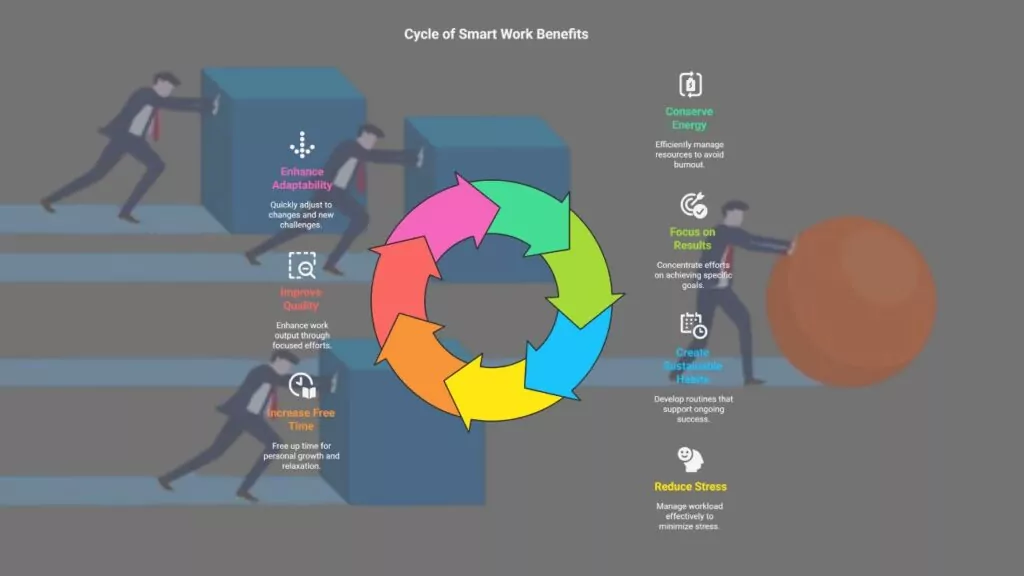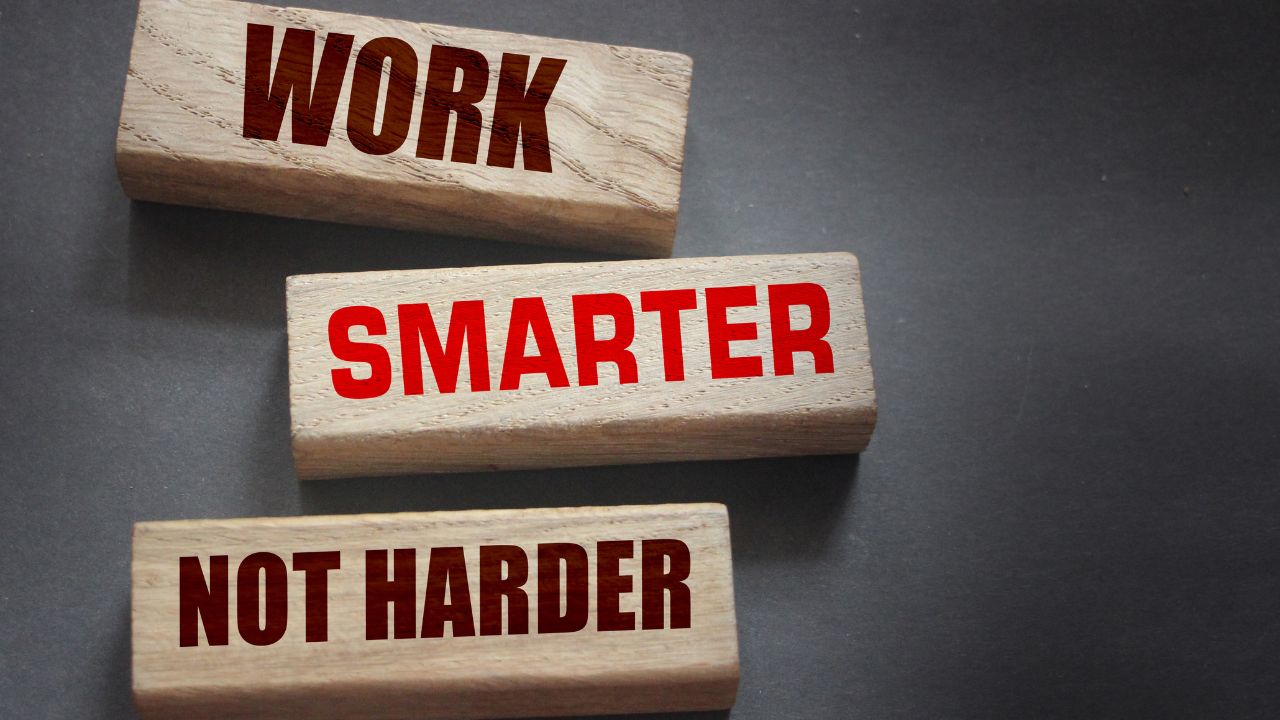Have you ever ended a busy day feeling like you accomplished nothing meaningful? You’re not alone. Many of us fall into the trap of working long hours, thinking that more time means more productivity. But in today’s fast-paced world, success often comes not from working harder but from working smarter.
Learning how to work smarter, not harder, is the key to achieving more with less stress. This doesn’t mean being lazy. It means being intentional—using better systems, clearer goals, and smarter time management.
In this article, you’ll discover 20 practical tips that help you improve focus, reduce burnout, and achieve your goals faster. From mastering your calendar to using technology wisely, these strategies are designed for busy people who want to make every minute count.
Let’s explore how to make success more about strategy than sweat.
What Does It Mean to Work Smarter, Not Harder?
Working smarter means being efficient and effective. It’s about using your time, energy, and tools in a way that helps you reach your goals faster—with less effort.
It’s not about doing more things. It’s about doing the right things.
Here’s a quick comparison:
| Working Harder | Working Smarter |
| Long hours | Focused time blocks |
| Multitasking | Deep, single-task focus |
| Busy with low-value tasks | Delegating and automating |
| Always “on” | Taking planned breaks |
| Burnout risk | Work-life balance |
Think of a carpenter using a dull saw. They might work longer, but with a sharpened blade (smarter strategy), the work gets done faster—and better.
Why Working Smarter Leads to More Success

Smart work drives long-term success because it helps you conserve energy, focus on results, and create sustainable habits.
Key Benefits:
- Less stress: You avoid burnout by managing workload better.
- More free time: Smart planning frees up space for personal growth.
- Improved quality: Focused efforts lead to better work.
- Greater adaptability: Smart workers can pivot quickly and effectively.
Studies from Harvard Business Review show that professionals who use structured planning and time-blocking techniques report 20–25% higher productivity levels than those who don’t.
20 Expert Tips to Work Smarter, Not Harder

Below are 20 powerful tips that will transform the way you work.
1. Set Clear, Achievable Goals
Start each week with specific goals. Use the SMART method:
| SMART Goals | Description |
| Specific | Define exactly what you want |
| Measurable | Track progress |
| Achievable | Set realistic expectations |
| Relevant | Align with your priorities |
| Time-bound | Set a deadline |
Instead of saying “I want to write more,” say “I will write 1 blog post by Friday.”
2. Prioritize Using the Eisenhower Matrix
This simple tool helps you decide what to work on first.
| Task Type | Action |
| Urgent + Important | Do now |
| Important, Not Urgent | Schedule it |
| Urgent, Not Important | Delegate |
| Not Urgent/Important | Eliminate |
This method helps you stop reacting and start planning.
3. Apply the 80/20 Rule (Pareto Principle)
Focus on the 20% of tasks that generate 80% of your results. For example, if you’re in sales, a few clients may bring in most of your revenue. Identify these key tasks—and do them first.
4. Leverage Time Blocking for Better Focus
Block out chunks of time in your calendar for specific tasks. Avoid checking email or social media during this time.
| Time Block | Task Example |
| 9:00–11:00 | Client work |
| 11:00–12:00 | Emails/Follow-ups |
| 2:00–4:00 | Deep creative work |
Stick to these blocks for better focus.
5. Avoid Multitasking: Embrace Single-Tasking
Multitasking can reduce productivity by up to 40%, according to Stanford research. Focus on one task at a time. You’ll get more done, and with better quality.
6. Automate Repetitive Tasks
Use automation tools like:
| Task | Tool |
| Social posting | Buffer, Hootsuite |
| Email sorting | Gmail filters, Zapier |
| Meeting booking | Calendly, Doodle |
These save hours every week.
7. Delegate or Outsource Strategically
You don’t need to do everything yourself. Delegate to a team member, a virtual assistant, or freelance platforms like Upwork or Fiverr. Focus your time on high-value tasks only you can do.
8. Batch Similar Tasks Together
Group similar tasks—like responding to emails or making calls—into one session. This reduces mental switching and helps you finish faster.
9. Use the Two-Minute Rule
If a task takes less than two minutes, do it immediately. This prevents small jobs from piling up and clogging your to-do list.
10. Learn to Say No Without Guilt
You don’t have to attend every meeting or say yes to every request. Politely decline or defer tasks that don’t align with your goals.
11. Declutter Your Workspace (Physical and Digital)
A messy workspace leads to mental clutter. Keep your desk clean. Organize files and folders for easy access.
| Area | Tips |
| Desk | Keep only essentials |
| Desktop | Use folders and labels |
| Phone/Apps | Uninstall distractions |
12. Take Strategic Breaks (Pomodoro Technique)
Use the Pomodoro method: work 25 minutes, break for 5. After four rounds, take a 15-minute break. It refreshes your brain and keeps energy high.
13. Review and Reflect Weekly
Spend 30 minutes each week to review progress, set new priorities, and remove tasks that no longer matter. Reflection leads to better decision-making.
14. Use Tools That Boost Efficiency
Leverage apps like:
| Tool | Purpose |
| Trello | Project management |
| Todoist | Task organization |
| Forest | Focus booster |
| Notion | Note + life manager |
Choose tools that match your workflow, not complicate it.
15. Learn Keyboard Shortcuts and Automations
Learn shortcuts in your main tools (Excel, Gmail, Word, etc.). You’ll save hours every week. Automate emails, file backups, or invoice reminders.
16. Master the Art of Saying “Done” Not “Perfect”
Perfectionism wastes time. Aim for “excellent,” not flawless. Done is better than perfect, especially when 80% of the impact comes from finishing.
17. Build Daily Micro-Habits
Start with tiny, repeatable habits like:
- Planning your day every morning (5 min)
- 10-minute digital detox after lunch
- Writing 100 words daily if you’re a writer
Small steps compound into big results.
18. Protect Your Energy: Sleep, Nutrition, and Movement
Working smarter also means taking care of your health. Get 7–8 hours of sleep, move your body daily, and eat brain-friendly foods (like nuts, berries, and greens).
19. Surround Yourself with Smarter Workers
Join communities or masterminds. Ask questions. Learn from others’ mistakes and wins. Collaboration helps you scale faster than working in isolation.
20. Keep Learning and Adapting
Industries change, tools evolve. Stay updated through books, podcasts, or online courses. Success favors those who adapt.
| Learning Platform | Focus Area |
| Coursera | Business, Tech |
| LinkedIn Learning | Productivity, Software |
| Skillshare | Creativity, Workflow |
Common Pitfalls to Avoid When Trying to Work Smarter
Even smart strategies can backfire when misused. Avoid these mistakes:
- Overplanning: Spending too much time creating the perfect system
- Productivity guilt: Feeling bad for taking breaks
- Relying too much on tools: Apps don’t replace strategy
- Chasing trends: Stick with what works for you
Stay focused on what’s meaningful to your success.
Final Thoughts: Working Smarter Is the New Working Harder
Working smarter not harder is more than a slogan—it’s a shift in mindset. It means being purposeful, using your time wisely, and focusing on results, not just effort.
Start with just two or three of the tips above. Track how your day changes. With consistency, you’ll find yourself achieving more—with less stress and more joy.
Remember, success isn’t about how busy you are—it’s about how effective you are. It’s time to sharpen your tools and thrive.




















